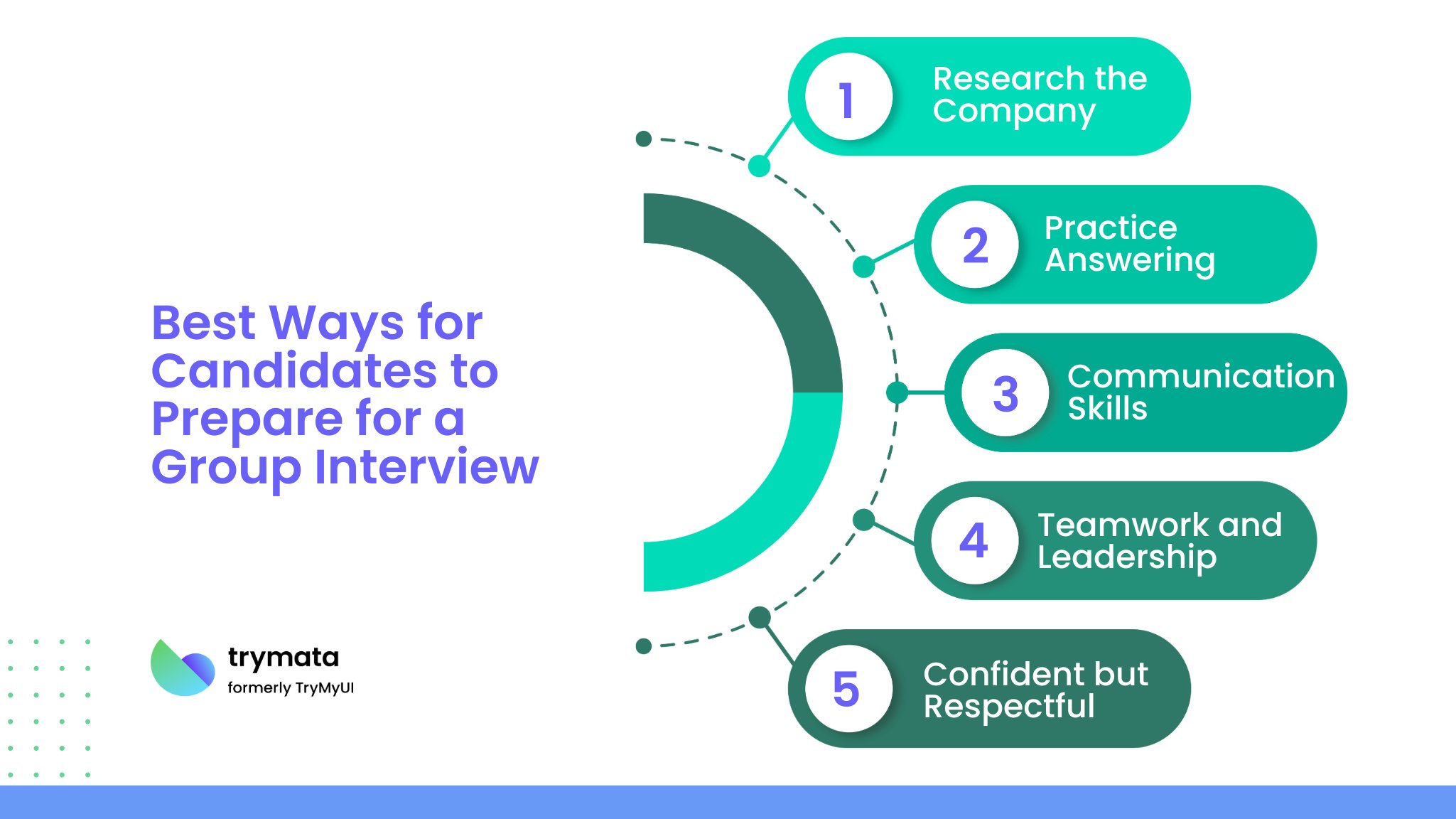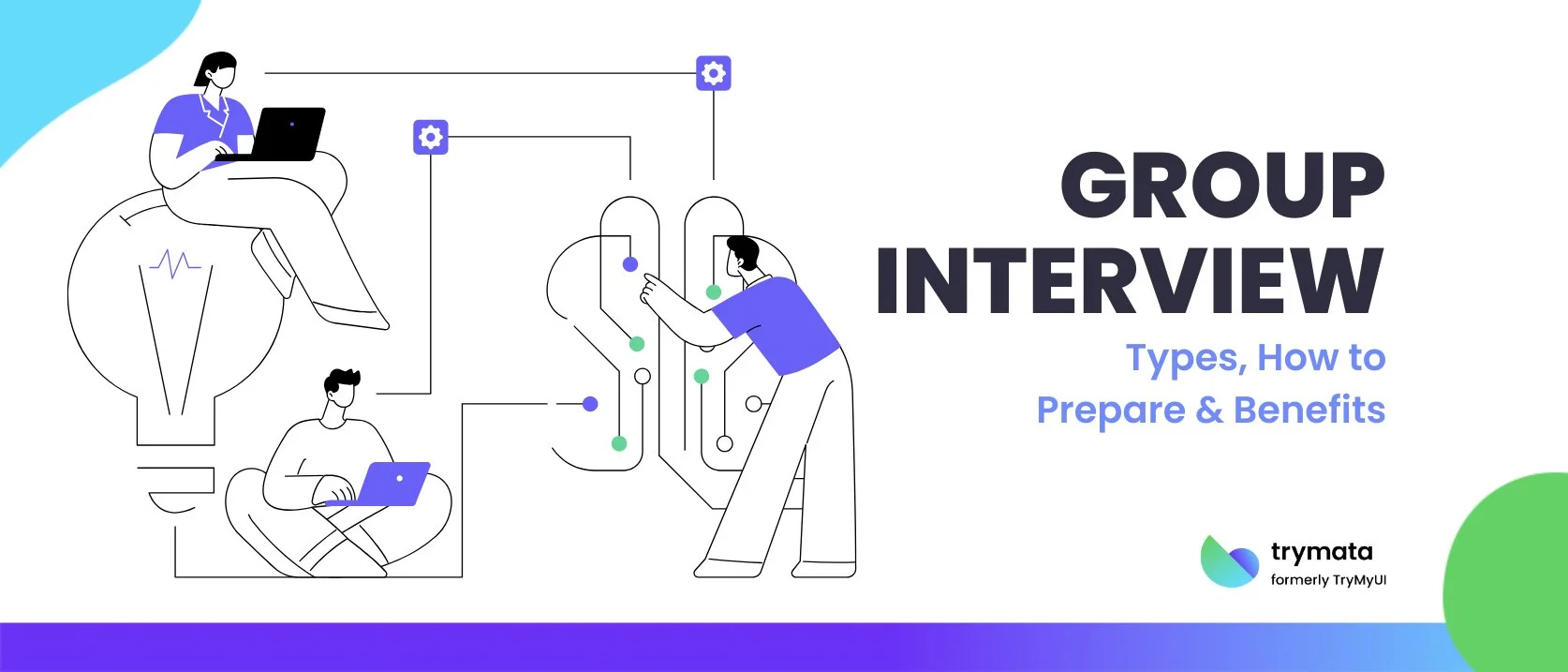A group interview is a dynamic hiring approach where multiple candidates are assessed together, allowing employers to evaluate communication, teamwork, and problem-solving skills in real time.
This method helps organizations streamline recruitment while gaining valuable insights into how candidates collaborate and handle workplace scenarios. Whether through panel discussions, group activities, or project-based tasks, group interviews highlight leadership potential, adaptability, and cultural fit.
For candidates, standing out requires strong communication, active participation, and a balanced approach to teamwork. Employers can make informed hiring decisions by structuring these interviews effectively and observing candidate interactions.
This blog covers everything you need to know about group interviews, from types and benefits to preparation tips for both employers and job seekers.
What is a Group Interview?
A group interview is a hiring process in which one or more interviewers interview multiple candidates. This method allows employers to assess candidates’ communication, teamwork, and problem-solving skills in a group setting.
Group interviews work well for evaluating how job seekers interact with others and handle real-life workplace situations. They are increasingly popular because they save time, provide valuable insights, and allow hiring managers to compare candidates effectively.
What Do Employers Evaluate in a Group Interview?
Employers conduct group interviews to assess candidate skills and behaviors in a team environment. They focus on:
- Communication Skills: How well candidates speak, listen carefully, and engage in group discussions.
- Teamwork Skills: How candidates interact with fellow candidates and contribute positively to group activities.
- Problem-Solving Abilities: How job candidates solve problems, offer creative solutions, and work under pressure.
- Leadership Potential: How candidates take initiative, encourage others’ ideas, and lead a group project.
- Interpersonal Communication: How candidates politely introduce themselves, maintain eye contact, and build relationships.
- Adaptability and Company Culture Fit: How well a candidate’s ability aligns with company values and workplace dynamics.
Types of Group Interviews
Group interviews can take different forms, depending on the hiring process and the job description. The most common types include:
1. Panel Interview
A panel interview involves multiple interviewers interviewing one candidate. This format is common in executive-level roles where HR professionals, managers, and team leads assess a candidate’s ability to answer questions from different perspectives.
2. Candidate Group Interview
In this format, many candidates are interviewed together, often participating in group discussions or group activities that assess teamwork and problem-solving skills. This method is commonly used for customer service, sales, and hospitality jobs.
3. Group Project or Task-Based Interview
Some employers prefer to assess candidates’ abilities by assigning a group project where they must collaborate to solve problems within a set timeframe. This approach provides great insight into how candidates handle pressure, work with different personalities, and contribute to team efforts.
How to Conduct a Group Interview
Employers should follow a structured approach to ensure a fair and insightful group interview process. Here’s how:
1. Define the Job Description and Goals
Employers must clearly outline the job description and expectations before conducting group interviews. Understanding what valuable skills are necessary for the role helps structure the interview process effectively.
2. Prepare Effective Group Interview Questions
Developing insightful questions that assess problem-solving, leadership, and interpersonal skills is crucial. Examples include:
- “Can you describe a time you worked in a team to solve a problem?”
- “How do you handle conflicts in a group setting?”
- “What do you think makes a successful team?”
3. Plan Group Activities
Incorporating group activities, such as brainstorming sessions, problem-solving exercises, or a group project, allows candidates to demonstrate their teamwork and communication skills in real-time.
4. Observe Candidate Interactions
Employers should pay close attention to how candidates interact with others, contribute to discussions, and respect different personalities in the room. Noticing how candidates listen carefully and respond to others’ ideas can provide valuable insights.
5. Conduct One-on-One Time
While group interviews save time, allowing one-on-one time with each candidate ensures a more comprehensive evaluation. This helps gauge individual strengths, clarify responses, and assess a candidate’s genuine interest in the role.
Best Ways for Candidates to Prepare for a Group Interview
Preparation is key for candidates to stand out in a group interview by demonstrating confidence and collaboration.

- Research the Company: Understanding company culture, values, and expectations helps job seekers tailor their responses to align with what the interviewer is looking for.
- Practice Answering Group Interview Questions: Candidates should prepare responses to common interview questions and practice answering questions in a group setting.
- Develop Strong Communication Skills: Speaking, making eye contact, and engaging in meaningful group discussions help candidates stand out positively.
- Showcase Teamwork and Leadership: Encouraging candidates to balance listening and speaking ensures they contribute effectively without dominating the conversation.
- Be Confident but Respectful: It’s essential for candidates to politely introduce themselves, respect fellow candidates’ opinions, and demonstrate professionalism throughout the interview process.
How Employers Prepare for a Group Interview?
Employers must plan and organize group interviews to effectively evaluate each candidate’s strengths.
1. Create a Structured Interview Process
Planning the group interview process ensures that interviews run smoothly and efficiently.
2. Assign Roles to Interviewers
Having one interviewer focus on communication skills while another assesses problem-solving abilities allows for a thorough evaluation.
3. Ensure a Comfortable Environment
Providing a relaxed yet professional setting encourages candidates to perform at their best.
4. Take Notes and Compare Performance
Tracking each candidate’s skills and contributions helps make an informed hiring decision.
Common Interview Questions for Group Interviews
Employers often use insightful questions that assess various skills. Some examples include:
- “Tell us about a time when you had to work with a team to solve problems.”
- “How do you handle disagreements in a team environment?”
- “Describe a situation where you had to take a leadership role.”
- “What strategies do you use to ensure effective communication in a group setting?”
- “Give an example of a successful group project you were involved in and your role in it.”
- “How do you manage conflicts between team members in a collaborative setting?”
- “Describe a time when you had to listen carefully to understand a different perspective.”
- “How do you adapt your communication style when working with different personalities?”
- “What steps do you take to ensure that everyone’s ideas are heard during discussions?”
- “Tell us about a time when you had to persuade a group to reach a common goal.”
Benefits of a Group Interview
Group interviews offer several advantages, including efficiency, cost savings, and valuable insights into candidate interactions.
- Time Efficient: Interviewing multiple candidates at once speeds up the hiring process.
- Cost-Effective: Reduces the resources spent on scheduling multiple one-on-one interviews.
- Great Insight: Allows interviewers to assess how candidates interact in real-life situations.
- Encourages Collaboration: Helps determine which candidates thrive in a team setting.
- Provides Valuable Insights: A well-rounded view of a candidate’s soft skills and interpersonal communication abilities.
Challenges of Group Interview
Despite their benefits, group interviews can pose challenges in assessing individual performance and managing group dynamics.
- Difficulty in Assessing One Candidate Thoroughly: Some candidates may get overshadowed by more outspoken peers.
- Managing Many Candidates: Ensuring fairness in evaluating multiple candidates simultaneously can be challenging.
- Different Personalities in One Setting: Some candidates may struggle with nerves or competition, affecting their performance.
Conclusion
Group interviews provide a valuable opportunity for employers to evaluate multiple candidates efficiently while allowing job seekers to showcase their strengths.
Group interviews are an efficient way to evaluate candidates’ teamwork, communication, and problem-solving skills. Employers gain valuable insights by observing how candidates interact, while job seekers can showcase their skills in a dynamic setting.
By preparing thoughtful interview questions and structuring the process effectively, companies can find the best candidate for their team while making the hiring process time-efficient and cost-effective.




